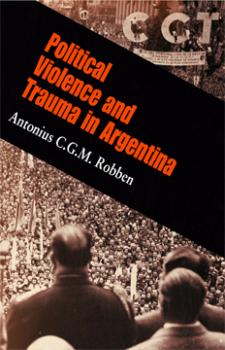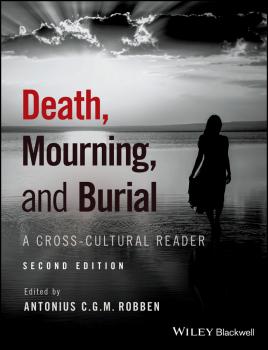ТОП просматриваемых книг сайта:
Antonius C. G. M. Robben
Список книг автора Antonius C. G. M. RobbenАннотация
A thought-provoking examination of death, dying, and the afterlife Prominent scholars present their most recent work about mortuary rituals, grief and mourning, genocide, cyclical processes of life and death, biomedical developments, and the materiality of human corpses in this unique and illuminating book. Interrogating our most common practices surrounding death, the authors ask such questions as: How does the state wrest away control over the dead from bereaved relatives? Why do many mourners refuse to cut their emotional ties to the dead and nurture lasting bonds? Is death a final condition or can human remains acquire agency? The book is a refreshing reassessment of these issues and practices, a source of theoretical inspiration in the study of death. With contributions written by an international team of experts in their fields, A Companion to the Anthropology of Death is presented in six parts and covers such subjects as: Governing the Dead in Guatemala; After Death Communications (ADCs) in North America; Cryonic Suspension in the Secular Age; Blood and Organ Donation in China; The Fragility of Biomedicine; and more. A Companion to the Anthropology of Death is a comprehensive and accessible volume and an ideal resource for senior undergraduate and graduate students in courses such as Anthropology of Death, Medical Anthropology, Anthropology of Violence, Anthropology of the Body, and Political Anthropology. Written by leading international scholars in their fields A comprehensive survey of the most recent empirical research in the anthropology of death A fundamental critique of the early 20th century founding fathers of the anthropology of death Cross-cultural texts from tribal and industrial societies The collection is of interest to anyone concerned with the consequences of the state and massive violence on life and death
Аннотация
The ruthless military dictatorship that ruled Argentina between 1976 and 1983 betrayed the country's people, presiding over massive disappearances of its citizenry and, in the process, destroying the state's trustworthiness as the guardian of safety and well-being. Desperate relatives risked their lives to find the disappeared, and one group of mothers defied the repressive regime with weekly protests at the Plaza de Mayo in Buenos Aires. How do societies cope with human losses and sociocultural traumas in the aftermath of such instances of political violence and state terror? In Argentina Betrayed , Antonius C. G. M. Robben demonstrates that the dynamics of trust and betrayal that convulsed Argentina during the dictatorship did not end when democracy returned but rather persisted in confrontations over issues such as the truth about the disappearances, the commemoration of the past, and the guilt and accountability of perpetrators. Successive governments failed to resolve these debates because of erratic policies made under pressure from both military and human rights groups. Mutual mistrust between the state, retired officers, former insurgents, and bereaved relatives has been fueled by recurrent revelations and controversies that prevent Argentine society from conclusively coming to terms with its traumatic past. With thirty years of scholarly engagement with Argentina—and drawing on his extensive, fair-minded interviews with principals at all points along the political spectrum—Robben explores how these ongoing dynamics have influenced the complicated mourning over violent deaths and disappearances. His analysis deploys key concepts from the contemporary literature of human rights, transitional justice, peace and reconciliation, and memory studies, including notions of trauma, denial, accountability, and mourning. The resulting volume is an indispensable contribution to a better understanding of the terrible crimes committed by the Argentine dictatorship in the 1970s and their aftermath.
Political Violence and Trauma in Argentina - Antonius C. G. M. Robben
The Ethnography of Political ViolenceАннотация
For decades, Argentina's population was subject to human rights violations ranging from the merely disruptive to the abominable. Violence pervaded Argentine social and cultural life in the repression of protest crowds, a ruthless counterinsurgency campaign, massive numbers of abductions, instances of torture, and innumerable assassinations. Despite continued repression, thousands of parents searched for their disappeared children, staging street protests that eventually marshaled international support. Challenging the notion that violence simply breeds more violence, Antonius C. G. M. Robben's provocative study argues that in Argentina violence led to trauma, and that trauma bred more violence. In this work of superior scholarship, Robben analyzes the historical dynamic through which Argentina became entangled in a web of violence spun out of repeated traumatization of political adversaries. This violence-trauma-violence cycle culminated in a cultural war that «disappeared» more than ten thousand people and caused millions to live in fear. Political Violence and Trauma in Argentina demonstrates through a groundbreaking multilevel analysis the process by which different historical strands of violence coalesced during the 1970s into an all-out military assault on Argentine society and culture. Combining history and anthropology, this compelling book rests on thorough archival research; participant observation of mass demonstrations, exhumations, and reburials; gripping interviews with military officers, guerrilla commanders, human rights leaders, and former disappeared captives. Robben's penetrating analysis of the trauma of Argentine society is of great importance for our understanding of other societies undergoing similar crimes against humanity.
Информация о книге
Автор произведения Antonius C. G. M. Robben
Аннотация
The definitive reference on the anthropology of death and dying, expanded with new contributions covering everything from animal mourning to mortuary cannibalism Few subjects stir the imagination more than the study of how people across cultures deal with death and dying. This expanded second edition of the internationally bestselling Death, Mourning, and Burial offers cross-cultural readings that span the period from dying to afterlife, considering approaches to this transition as a social process and exploring the great variations of cultural responses to death. Exploring new content including organ transplantation, institutionalized care for the dying, HIV-AIDs, animal mourning, and biotechnology, this text retains classic readings from the first edition, and is enhanced by sixteen new articles and two new sections which provide increased breadth and depth for readers. Death, Mourning, and Burial, Second Edition is divided into eight parts reflecting the social trajectory of death: conceptualizations of death; death, dying, and care; grief and mourning; mortuary rituals; and remembrance and regeneration. Sections are introduced through foundational texts which provide the ideal introduction to this diverse field. It is essential reading for anyone concerned with issues of death and dying, as well as violence, terrorism, war, state terror, organ theft, and mortuary rituals. A thoroughly revised edition of this classic anthology featuring twenty-three new articles, two new sections, and three reformulated sections Updated to include current topics, including organ transplantation, institutionalized care for the dying, HIV-AIDs, animal mourning, and biotechnology Must reading for anyone concerned with issues of death and dying, as well as violence, terrorism, war, state terror, organ theft, and mortuary rituals Serves as a text for anthropology classes and provides a genuinely cross-cultural perspective to all those studying death and dying




